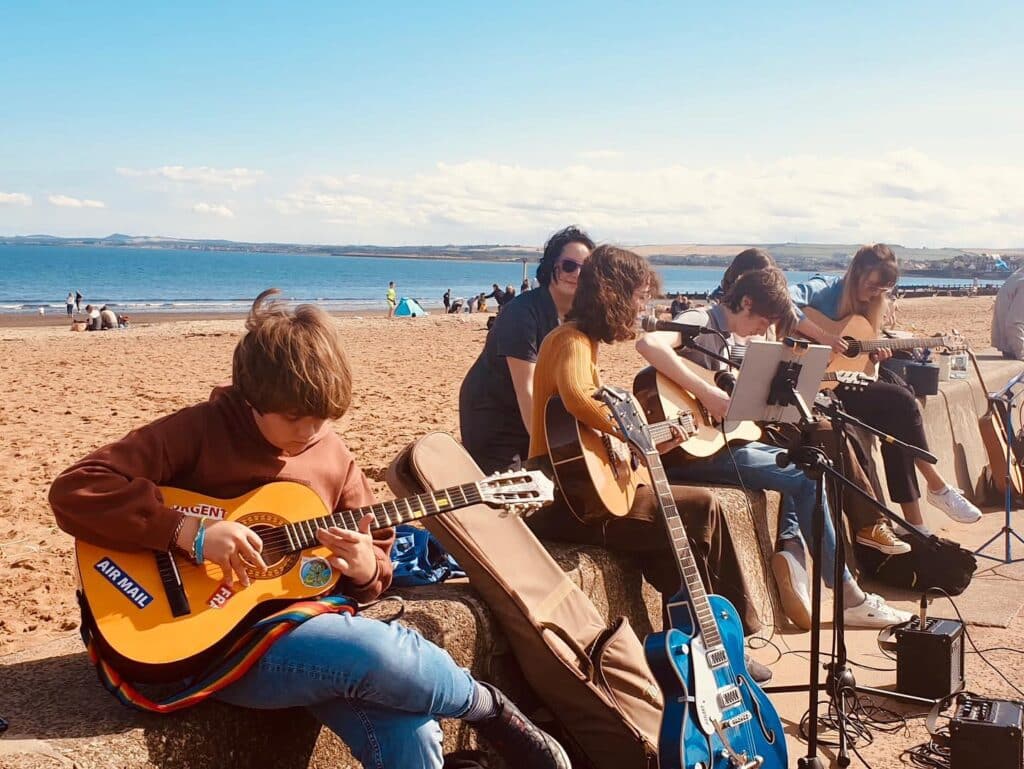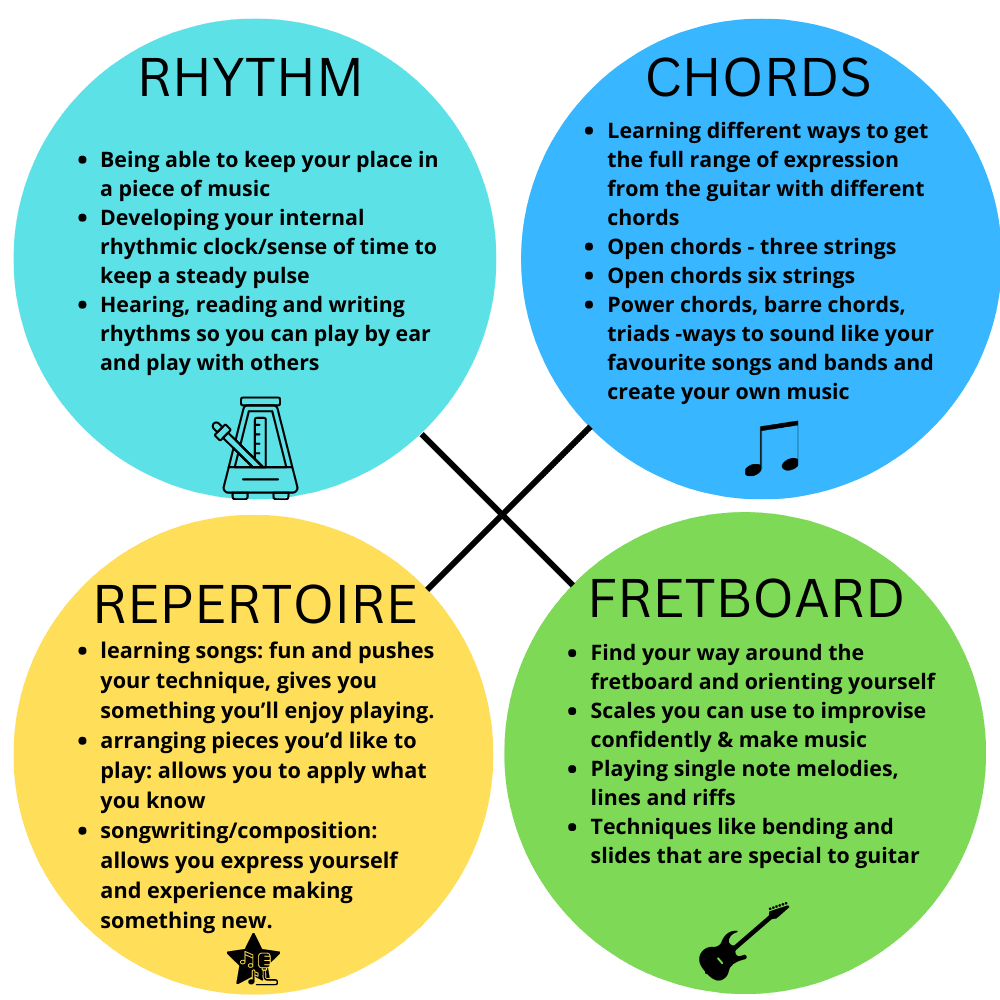This article has some easy, effective tips on how to get started looking for guitar lessons near you. Whether you’re using google maps as a search tool, getting recommendations from friends or comparing teachers based on their web presence, when it comes to meeting them, here are some ways to assess the match between you and the teacher.
1. Think about what you’d love to be able to do and play and experience
If you could have it all your own way, and your skill level was unlimited, what would give you the most enjoyment with your guitar playing? Perhaps you’d really love to be able to improvise freely, perhaps you’d really enjoy playing well-known songs for friends and family. Maybe you’ve experienced the fun of a rousing singalong at a party, and you’d like to be able to do that for others too. Maybe you’d like to write your own songs, or be able to play songs you love.
Maybe you don’t necessarily have a very clear idea of what you’d ideally like to be able to do on guitar yet, but you’re drawn to the sound and you want to experience it. That’s fine too. It can take some time to work out what you’re most drawn to, and a good teacher will help you identify that as your lessons progress.

When you’re looking for a teacher, anything you have identified already about your interests and ideal outcomes will help you make sure there’s a good match between what you want to do and what that teacher is experienced in. If you aren’t too sure, being able to let the teacher know that you would like some help refining your objectives as you start to develop skills is also a great thing to be able to tell a prospective teacher when you meet them.
2. Have some questions for possible guitar teachers you meet
When you’re starting out in a new subject area, it’s sometimes hard to know how to compare different possibilities. Do you compare by price? By which prospective guitar teacher is closer? By a general impression you get from the person? It is really important that you feel comfortable around them and that you’re going to enjoy the time you invest in having lessons, but there are also some simple questions you can ask that will give you some ways of assessing what might be the best match with what you want to learn.
The cheapest per hour guitar lessons tend to be offered by inexperienced teachers and there is a risk they will cost more long term since you will need to take many lessons and you may not be able to do very much by the end. Worse than poor value for money though is quitting because you think you were no good (because you didn’t feel like you were progressing) when actually it’s because the input you received was well intended but not all that effective.
That’s why it’s great starting out with some idea of the areas you’re most interested in – so you can ask whether the guitar teacher has experience helping learners of a similar background to you, and whether they are experienced in teaching the style you’re interested in learning.
What should I do in between lessons?
This may seem like an obvious answer – practice – but it’s not. How do you practice? What exactly should you do when you practice? If you’re advised to practice for 15-30 mins 4-5 times a week (which will secure good progress in beginning guitarists if you’re working in the right way) what are you doing precisely for those minutes? When I was a child, I took piano lessons for a number of years.
For all that time, I thought “practice” meant – playing my pieces from beginning to end. In fact, that is a very incomplete way even of practising those particular pieces, let alone developing longer term and more solidly rooted musical foundations. You will make the most progress if you are completely confident that every time you pick up the guitar, you know exactly what to do, and you know why this is developing your coordination in the right way.
How do you decide what to teach me, and in what order?
A good teacher, after gaining a clear understanding of your goals and interests (or guiding you through a process to identify and then regularly review your musical interests), should have an overall plan for helping you achieve them. Important: a strategy is not the same as ‘what song do you want to learn today?’ This can SEEM like it’s tailored to you, but by itself this approach can result in you taking months of lessons, learning a few songs, but having little understanding of music or guitar outside of those songs.

If a teacher asks you this, by definition they have not prepared in any depth or detail for your time together. It’s absolutely the case that the ideal learning path is going to include songs and material you will enjoy playing, but approaching guitar only this way doesn’t empower you to become a confident musician. Most people who learn this way get bored of the songs eventually, stop playing them, and end up back where they started. This is not a great result!
3. Check out reviews and social media
It’s reassuring when you get a sense of the experience others have had with a teacher or school. You can read about what others most valued about their tuition and see what they had to say about it. Social media posts and videos and content on YouTube will also give you a flavour of the personalities of the teachers and a sense of whether you’d enjoy their style. Have a look at our instagram on www.instagram.com/key_to_music to see pictures of some of our student events, themes in the tuition and learning tips.
4. Don’t be afraid to compare and ask for information
We are always happy to advise students and refer, and we do free phone and in person guitar learner consultations so that people interested in learning guitar can meet us and have a sense of our teaching philosophy and what they can expect to receive from us. We only enrol learners we are totally confident we can help. Feel free to drop us a line or ask any questions here.
5. See how you enjoy the experience of being with the teacher
90% of beginning guitarists quit lessons within the first 12 months. But no one starts out with the intention of quitting. If you start something, and realise you don’t enjoy the process enough to justify the time, when there is something else you could also invest that time into that you would enjoy more, then quitting might be a good decision. But usually that’s not why people quit. They don’t enjoy the overall process enough, they feel stressed about practising or overwhelmed, or they don’t enjoy the class time enough.
so it’s important to feel like you’re going to enjoy spending time with the teacher. It’s the job of the teacher to make the process enjoyable and to help you manage the other parts of the process.